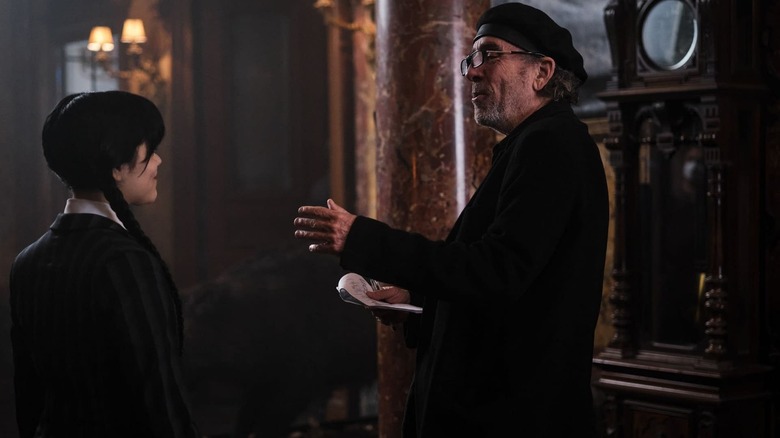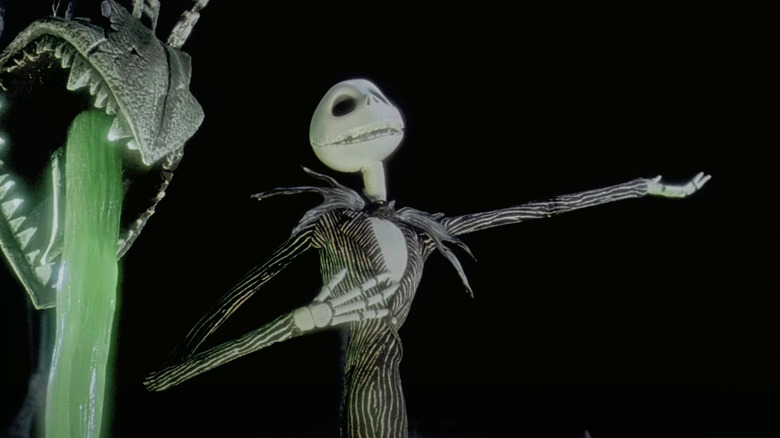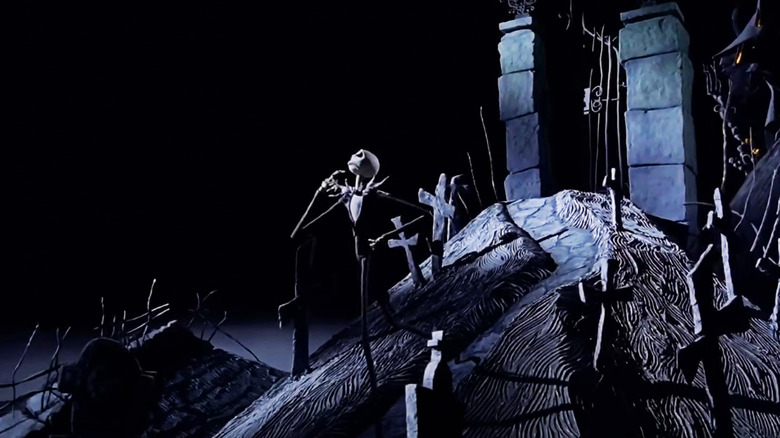Tim Burton Didn't Direct His Highest-Rated Film On Rotten Tomatoes
The prevailing wisdom on Tim Burton is that he's somewhat lost his way as his career has gone on. Whereas his early filmography is marked by some of the most influential films of the last few decades, his later output has relied a little too heavily on a CGI version of his famously hand-crafted aesthetic and neglected the fundamental elements that make a good story. However, with the news that his upcoming "Beetlejuice Beetlejuice" once again embraces practical effects, we might be about to witness a Burton renaissance.
Still, there's no getting around the fact that in most rankings of Tim Burton films, his older work is usually at the top. In terms of critical response, you'll typically find "Ed Wood," his 1994 biopic of the cult filmmaker, in the top spot, followed by more universally beloved classics such as "Edward Scissorhands" or the original "Beetlejuice." I, having become transfixed by his Batman movies as a kid, would put those in the top spot, but accept that "Ed Wood," "Scissorhands," and "Beetlejuice" are all thoroughly deserving of their status as some of Burton's most-loved works.
However, in 2024, we have yet another source to consider when it comes to appraising a filmmaker's art: Rotten Tomatoes. Yes, try as we might to avoid it, the review aggregator is a powerful force in shaping our collective taste and codifying our shared opinion on movies — and when it comes to Burton, RT has a different take on which of his films deserves the top spot in a ranking of his best work.
Tim Burton's highest-rated film on Rotten Tomatoes
Tim Burton's best film, according to his Rotten Tomatoes page, is "The Nightmare Before Christmas." Now, most fans will know that he provided the story, character designs, and co-produced the film, but did not direct it. That job was taken on by stop-motion expert Henry Selick, who would go on to helm "James and the Giant Peach" and "Coraline." So, what's going on here?
Well, since Burton was so integral to the movie's creation, "Nightmare" is included in RT's ranking of his films and has managed to become his best-reviewed film, with a 95% critic score, closely followed by "Ed Wood" with 92%. Indeed, when it first released, Disney marketed the movie as "Tim Burton's The Nightmare Before Christmas," which was a shrewd move considering the filmmaker's post-"Batman" and "Edward Scissorhands" success in the early-90s.
Not that Burton cares about Rotten Tomatoes — as well he shouldn't, considering this is the site that claims there are only two perfect sci-fi movies in the history of cinema — but to work for decades as a filmmaker and then have the one film you handed off to another director become your highest-reviewed movie surely isn't the ideal scenario for Burton. Again, none of this is all that important — merely a neat little oddity to arise in the course of the man's impressive career.
Burton can be proud of The Nightmare Before Christmas' RT score
While having "The Nightmare Before Christmas" become his highest-rated film on RT surely isn't the scenario Tim Burton ever envisioned, if you're Henry Selick, it's got to be nice little win. Despite previously revealing he was a little tired of audiences associating "Nightmare" with Burton, Selick more recently told People, "It bothered me more years ago. It doesn't bother me at all now." That said, it's still got to sting that Selick didn't get any of the movie's wild merchandise profits.
More importantly, there's every reason for Burton to be proud of the film's critical triumph. "The Nightmare Before Christmas" was influenced by legendary horror classics such as "The Cabinet of Dr. Caligari," as well as several Gothic artists, both of which helped shape Tim Burton's own art style. But the Burton aesthetic really was the driving force behind the movie's visuals, with the filmmaker designing all the characters himself long before production got underway on the film. What's more, as the director previously told Empire, Jack Skellington, this character "that's perceived as dark, but is really light," is very "personal" to him, with Burton going on to say that characters such as this represented his own feeling of being "perceived as this dark character, when [he] didn't feel that way."
So, while "Nightmare" isn't technically Burton's film, the look and feel of it, as well as the story being told, is unmistakably Burtonian. As such, regardless of who directed the film, Burton can be proud of its standing as a critically-acclaimed classic.


